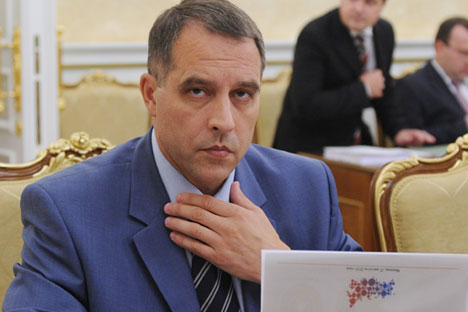Cooperation with India to get major boost - Russian Deputy Energy Minister

Yuri Sentyurin: "The leading Russian companies in the energy field are interested in cooperating with India on the whole range of issues." Source: Maxim Shemetov / TASS
What are the main achievements of the meeting of the Russian-Indian Working Group on Energy and Energy Efficiency?
First, I would like to say that this was already the 19th meeting of this group, which in itself indicates the sustained interest of Russia and India in the energy and energy efficiency areas. This interest is in no way diminishing, and we believe that, to the contrary, it continues to grow. This is due to the fact that India is striving to achieve energy independence. Achieving this goal – in a situation of fluctuating oil prices, a quickly developing region, as a whole, and particularly India – is not that easy. Be things as they may, it is nevertheless necessary for the country to diversify its energy supply sources, and from this point of view, for our partners, Russia seems a promising, reliable and long-term partner.
All of this is reflected in those ideas that we recorded in the minutes of the meeting that recently ended. In particular, noted in the minutes was the promising liquefied natural gas (LNG) market. This is a very dynamic market, which continues to see growing volumes of shipments. Russia enjoys a strong position in this market, including through our plans to increase capacity in the far north (Yamal Peninsula) and the Far East (Sakhalin, Vladivostok). By 2030, we plan to capture 25-30 percent of the LNG market in the Asia-Pacific Region. Obviously, we are interested in a stable demand for our raw materials, and for us, India is seen as a long-term and strategic partner in this area.
Secondly, new players have emerged. These are leading Russian companies interested in forming joint-venture projects with India, including in third countries. This is a new situation. Previously, we both focused on projects in our own countries, but now we are talking about third countries. These new players are Rosneft, Gazprom Neft, and Zarubezhneft. Thus, now we are talking about new bilateral energy relations.
We see great possibilities for cooperation in the coal sector. Our country has many leading coal companies and research centres, which have such interesting technologies as ground coal gasification and the extraction of methane from coal-beds. All this has been offered to our Indian partners, they in turn expressed great interest in our proposals.
The leading Russian companies in the energy field, such as Inter RAO - Engineering, RusHydro, Tekhnopromexport, Siloviye Mashiny, and ORGRES, are interested in cooperating with India on the whole range of issues – ranging from design and construction, to delivery, equipment installation, and warranty service. I should mention that there was a break in cooperation between our countries after the collapse of the Soviet Union, which had actively participated in various power generation projects in India.
Innovative areas of cooperation have also opened up – such as energy audits and energy surveying. We have many things to offer, and we hope that the talks on this issue continue and Russian companies will come to India to conduct energy surveying work.
This work on areas of cooperation, about which you speak, will it be somehow systematized?
All of these things that I mentioned, we wish to be documented at the company level, with signed memorandums of understanding and intentions, as well as at the level of governments, by signing appendices to the Agreement between the Governments of India and Russia on Cooperation in the Oil and Gas Sector, concluded back in 2010. This has already been approved and will turn into a program, which we hope will be ready for the top-level Russian-Indian Summit in December. The appendix will include approximately 10 items, each involving a specific project – the terms of implementation and persons responsible for their execution.
Once again, I would like to say that this appendix should clearly specify the energy projects being planned by our two countries.
In a joint statement made by Russian President Vladimir Putin and then-Indian Prime Minister Manmohan Singh after the Russian-Indian Summit in Moscow in October 2013, it was mentioned that the parties “have agreed to explore the possibility of direct overland transportation of hydrocarbons from Russia to India and also agreed on the formation of a joint study group to achieve this goal.” Here we are talking about a Russia-India oil pipeline and a Russia-China-India gas pipeline. Has there been any progress on this issue?
Yes, my colleagues and I have agreed that we would take the final step in creating a working group to study the possibility of supplying hydrocarbons overland from Russia through Central Asia to India. This is a fundamental and very important decision – the concept of the future. For us, this is an ambitious task, which is certainly worth studying from all sides, and this is what the working group will be doing. At the moment, we are in the final stages of its formation. Starting in the first quarter of 2015, we will begin meeting on a regular basis, involving all the important professionals in this area, in order to find and propose various options for implementing this plan to our corporate sector. This process will be completed before the end of November.
How are negotiations progressing between Novatek and companies in India, China and Japan, on selling a 9 percent share of the Russian company’s Yamal LNG project?
The negotiations are continuing. Our delegation includes representatives from Novatek, who have once again confirmed their interest in attracting strategic partners. Moreover, we have recorded in the minutes, that the Russian side is offering India an opportunity to participate in developing LNG projects being implemented in the Gydan Peninsula and in the waters of Ob Bay.
The minutes also describe the deployment on Sakhalin Island of an LNG project in parallel with an oil project, in which India already participates. What does this mean?
We are looking at measures to achieve efficient commercial exploitation of gas reserves in the Sakhalin-1 field. There are several ways of doing this. The first method has already been implemented – a plant was built with a capacity of up to 11 million tons of LNG per year. Given the available resources, it is possible to build a second plant and thus significantly increase export capacity. We are proposing different options for India to participate in this project.
Will India be able to take part in Russian projects in the Arctic?
Yes. We were the first to offer Indian companies an opportunity to participate in projects involving the exploration, development, production, processing and supply of hydrocarbons in Russia, including in the Arctic and Eastern Siberia.
All rights reserved by Rossiyskaya Gazeta.
Subscribe
to our newsletter!
Get the week's best stories straight to your inbox


